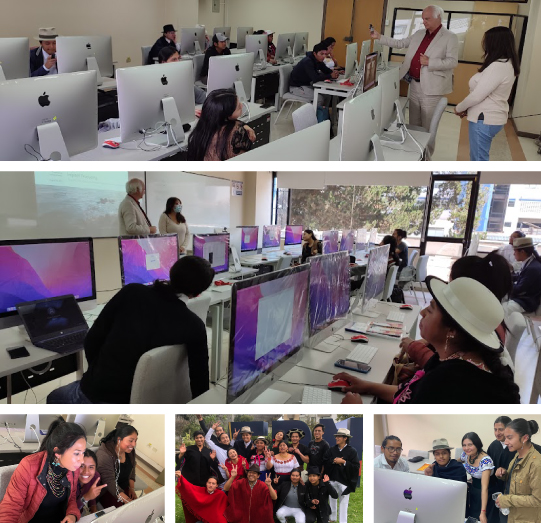 The Planetary Health Film Lab’s Indigenous Film Festival premiered on August 19th, 2022, and showcased fifteen short documentary films made by Indigenous youth from across Ecuador and the Amazon that spoke to issues and solutions around climate change and the environment in their community or country.
The Planetary Health Film Lab’s Indigenous Film Festival premiered on August 19th, 2022, and showcased fifteen short documentary films made by Indigenous youth from across Ecuador and the Amazon that spoke to issues and solutions around climate change and the environment in their community or country.
Led by Dahdaleh Institute Research Fellow Dr. Mark Terry, the 2022 edition of the Planetary Health Film Lab was offered to Indigenous youth from Ecuador who wishes to share a story about climate change and health and wants to do so through film. Now in its third year, the Planetary Health Film Lab is an interdisciplinary program culminating in an intensive week-long workshop designed to provide participants with the knowledge, skills, and tools to make short documentary films for the United Nations.
All the films produced in this year’s Planetary Health Film Lab by the students in Ecuador will be added to the Youth Climate Report.
Click here to check out the promotional film the participants created together
Click here to watch all the videos and find the descriptions for each film from the Planetary Health Film Lab 2022 – Ecuador
The films produced in the Indigenous languages of Kichwa and Shúar with English and Spanish subtitles were made by twenty young people representing 11 different Indigenous communities throughout Ecuador.
The Filmmakers:
 Following a series of online meetings over the summer between Dr. Terry and the budding young filmmakers, he travelled to Ecuador for the month of August to work with the Indigenous youth to produce films. The group then gathered for an intense week-long workshop at the Escuela Politécnica Nacional in Quito for an impressively productive session.
Following a series of online meetings over the summer between Dr. Terry and the budding young filmmakers, he travelled to Ecuador for the month of August to work with the Indigenous youth to produce films. The group then gathered for an intense week-long workshop at the Escuela Politécnica Nacional in Quito for an impressively productive session.
The participants learned how to tell stories from their communities that communicate data, research, and life experiences related to global and planetary health. The workshop is designed to teach specific theories, techniques, and modes of social issue filmmaking and provide hands-on experience with new digital technologies and platforms.
Dr. Terry guided these talented and enthusiastic students as they produced an excellent set of videos that meet their goal of sending effective messages to international policymakers, their own country leaders, and their communities. This is what the UNEP needs to go forward and address issues ~ an on-the-ground view of what is really going on presented visually for more impact. The beauty of this evolving GIS map is that it does not only present issues, but it also presents modern-day solutions to issues, simple solutions, and ways indigenous ancestors have been cultivating managing water, and getting by without having a negative effect on mother earth, such as using insecticides, polluting waterways, mismanaging land, and more.
Dr. Terry would like to express his gratitude to the students and organizers of the festival, which included dance performances, press releases, and great exposure for the efforts of the young filmmakers and their messages.

